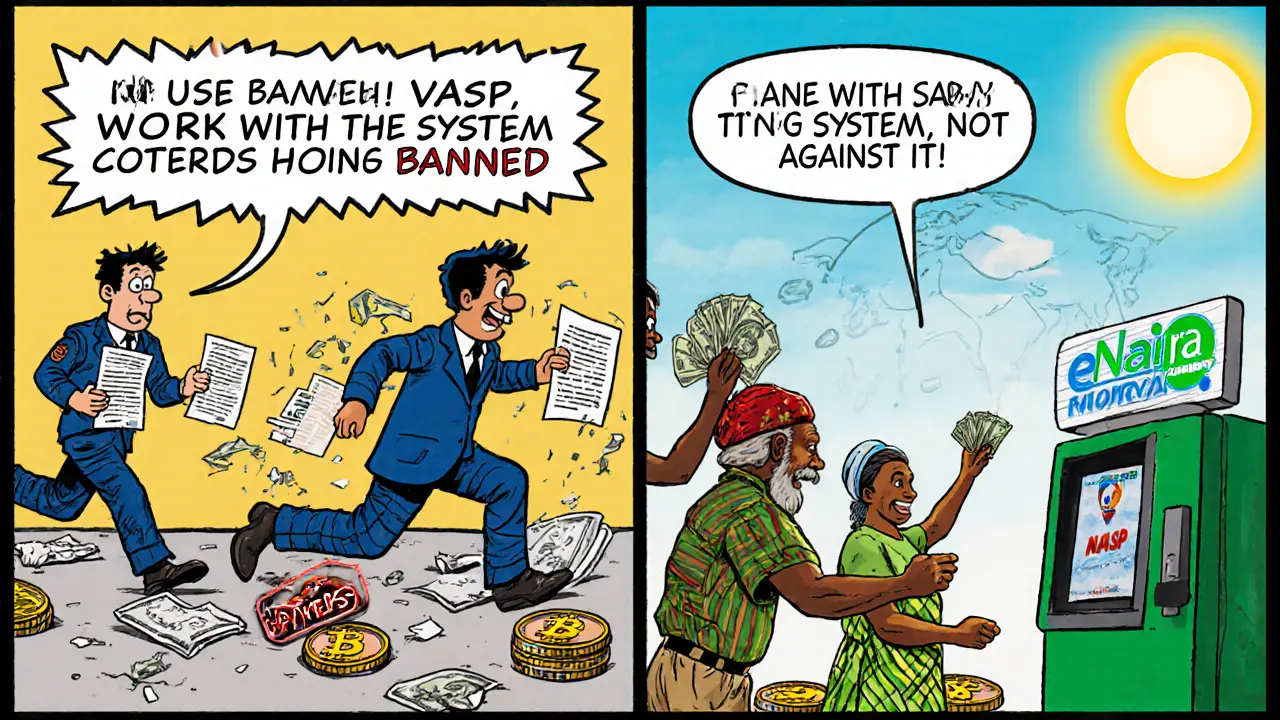Nigeria Crypto Payment Cost Calculator
Calculate the total costs of accepting cryptocurrency payments through licensed VASPs in Nigeria. This tool helps you understand the real financial impact of crypto payments under the new regulatory framework.
Can a business in Nigeria legally accept Bitcoin, Ethereum, or USDT as payment for goods or services? The short answer is: not directly - but there’s a legal workaround that’s reshaping how companies handle crypto payments.
In 2025, Nigeria’s crypto landscape changed dramatically. The Investments and Securities Act (ISA) 2025, signed into law on March 29, 2025, didn’t ban cryptocurrency. Instead, it reclassified it. Crypto is no longer treated as money. It’s now classified as a security - meaning it falls under the oversight of the Securities and Exchange Commission (SEC), not the Central Bank of Nigeria (CBN). This shift was meant to protect investors, but it created a major roadblock for businesses wanting to use crypto like cash.
Here’s the key point: the Naira is still the only legal tender in Nigeria. That means by law, you can’t accept Bitcoin as payment the same way you accept cash or bank transfers. If you’re a shop owner, restaurant, or e-commerce seller and you try to take USDT directly from a customer, you’re breaking the law - even if the customer is willing and the transaction is legitimate.
Who Can Legally Accept Crypto in Nigeria?
Only businesses registered with the SEC as Virtual Asset Service Providers (VASPs), Digital Asset Operators (DOPs), or Digital Asset Exchanges (DAEs) can legally handle crypto transactions. These are not regular stores or service providers. They’re licensed platforms like Quidax, Bybit Nigeria, and Binance Nigeria - companies that act as intermediaries between crypto users and the traditional financial system.
To become a VASP, a business must meet strict requirements:
- Minimum capital of ₦500 million (about $350,000 USD)
- 24/7 transaction monitoring systems
- ISO/IEC 27001-certified cybersecurity protocols
- Full AML/CFT compliance with the Nigerian Financial Intelligence Unit (NFIU)
- 145+ days of application processing with a 63% rejection rate
These rules were designed to stop fraud and money laundering. And they’ve worked - SEC data shows crypto scams dropped 63% in Q2 2025 compared to late 2024. But for small businesses, these barriers are impossible to clear. The cost, complexity, and time involved make it unfeasible for anyone without serious funding or legal teams.
How Do Businesses Actually Accept Crypto Then?
If you can’t accept crypto directly, how do Nigerian businesses use it at all? The answer is: through licensed VASPs as payment processors.
Here’s how it works in practice:
- A customer pays you in USDT or BTC via a QR code or wallet address.
- The payment goes to a VASP platform you’ve partnered with - like Quidax or BitFinance.
- The VASP instantly converts the crypto into Naira.
- The Naira is deposited into your bank account.
This setup is legal because the business never holds or manages crypto. The VASP handles everything - custody, conversion, compliance. You, as the merchant, only ever receive Naira. You’re not accepting crypto as payment; you’re accepting Naira that was generated from crypto.
But there’s a catch. These services charge fees - usually between 1.5% and 3.5% per transaction. For a small business selling low-margin goods, that eats into profits fast. One Jumia vendor told X (formerly Twitter) in September 2025: “I had to turn away international customers who wanted to pay in USDT. I had to convert it to Naira first, and the extra steps and fees made it not worth it.”

What Happened to Direct Crypto Payments?
Before the ISA 2025, many Nigerian businesses accepted crypto directly. E-commerce stores, freelancers, and even some brick-and-mortar shops took Bitcoin as payment. In 2024, Nigeria was the second-largest crypto market in the world by peer-to-peer volume, with over $1.2 billion in monthly transactions.
But after the new law, merchant adoption collapsed. According to Breet.io’s August 2025 survey of 500 Nigerian merchants:
- 78% tried accepting crypto before 2025
- Only 11% still do - and all of them use VASP intermediaries
- 89% said SEC registration complexity was the main reason they stopped
- 76% cited high compliance costs
Businesses that tried to go it alone got warning letters from the SEC. One Lagos-based e-commerce owner, who asked to remain anonymous, said: “We got a notice in January 2025 saying we were operating illegally. We shut down our crypto option immediately. We didn’t have the money to register as a VASP.”
How Does Nigeria Compare to Other African Countries?
Nigeria’s approach is unique in Africa.
- South Africa: Allows businesses to accept crypto as direct payment under its Financial Sector Regulation Act. No need for intermediaries.
- Kenya: Still bans crypto as payment for goods and services entirely.
- Ghana: Allows limited acceptance through a regulatory sandbox, but only for pilot programs.
Nigeria’s model is the strictest in terms of merchant access. A June 2025 report by the African Fintech Network gave Nigeria a 7.2/10 for investor protection but only 4.8/10 for merchant friendliness. The report concluded: “Classifying crypto as a security instead of a payment tool adds unnecessary friction for everyday commerce.”

What’s Next? Is the Law Changing?
There are signs the government is listening. On September 18, 2025, the SEC announced a six-month review of the merchant acceptance rules. Director General Emomotimi Agama admitted the framework may be “too rigid for small businesses.”
Proposed changes under discussion include:
- A new category called “Digital Payment Vehicle” for merchant use
- Lower capital requirements - possibly ₦50 million instead of ₦500 million
- Simplified AML procedures for small merchants
- Faster licensing with a dedicated crypto help desk (launched in July 2025)
At the same time, the Central Bank of Nigeria launched its own digital currency, the eNaira, in October 2025. It already has over 1.2 million users in its first week. Many analysts believe the eNaira is meant to replace the need for private crypto in everyday payments - not to complement it.
For now, the message is clear: if you’re a business in Nigeria and you want to accept crypto, you can’t do it alone. You need a licensed partner. And even then, you’re paying a price - in fees, control, and convenience.
What Should a Business Do Right Now?
If you’re a Nigerian business owner thinking about crypto:
- Don’t accept crypto directly - it’s illegal and risky.
- Partner with a licensed VASP like Quidax, Bybit Nigeria, or BitFinance. These platforms are SEC-approved and handle compliance for you.
- Calculate the real cost - include the 1.5-3.5% fee, any integration costs, and the time spent managing the system.
- Target international customers - they’re more likely to pay in crypto, and you’re less likely to face pushback from local regulators.
- Stay updated - the SEC’s review could lead to changes by mid-2026. Subscribe to SEC announcements or follow licensed VASPs for updates.
For now, crypto in Nigeria is a tool for investment and remittances - not for buying bread or paying for a haircut. But if you’re smart about how you use it, you can still benefit from the growing crypto economy - without breaking the law.
Is it legal to accept Bitcoin as payment in Nigeria in 2025?
No, it is not legal for businesses to accept Bitcoin or any cryptocurrency as direct payment for goods or services. The Nigerian law recognizes only the Naira as legal tender. Cryptocurrency is classified as a security under the ISA 2025, not as currency. Accepting it directly violates the Central Bank of Nigeria Act 2007 and could lead to regulatory action from the SEC.
Can Nigerian businesses use crypto at all?
Yes, but only through SEC-licensed Virtual Asset Service Providers (VASPs). Businesses can integrate platforms like Quidax or Bybit Nigeria that convert crypto payments into Naira instantly. The business receives Naira in its bank account, while the VASP handles all crypto-related compliance, custody, and conversion. This is the only legal way to accept crypto in Nigeria today.
What happens if a business accepts crypto directly?
The SEC can issue warning letters, freeze bank accounts linked to the business, or impose fines. In severe cases, businesses may be shut down or face criminal charges for operating without a license. Since March 2025, over 120 businesses have received official notices for unauthorized crypto transactions, according to SEC public records.
How much does it cost to become a licensed VASP in Nigeria?
The minimum capital requirement is ₦500 million (about $350,000 USD). Setup costs for technology, compliance systems, legal documentation, and staff training range from ₦85 million to ₦200 million. Ongoing compliance costs average 2.8% of monthly transaction volume. Most small businesses cannot afford this - which is why over 89% of merchants stopped accepting crypto after the ISA 2025.
Will Nigeria allow direct crypto payments in the future?
Possibly, but not soon. The SEC announced a six-month review in September 2025, and proposals are being considered to create a new “Digital Payment Vehicle” category with lower capital requirements (possibly ₦50 million). However, officials have made it clear they won’t recognize crypto as legal tender. Any future changes will likely be limited to a regulated payment channel, not full acceptance as currency.
Why does Nigeria treat crypto as a security instead of money?
The government’s goal is to protect investors from fraud and market manipulation. By classifying crypto as a security, the SEC can enforce disclosure rules, require licensing, and monitor trading - similar to how stocks are regulated. The Central Bank argues this prevents crypto from destabilizing the Naira or undermining the financial system. Critics say it ignores the practical use of crypto as a payment tool, especially for the 36% of Nigerians who are unbanked.
What’s the difference between a VASP and a regular business accepting crypto?
A VASP is a licensed company that holds, transfers, or exchanges crypto on behalf of others. It’s regulated, insured, and monitored by the SEC. A regular business accepting crypto directly holds the crypto itself - which is illegal under current law. VASPs act as middlemen; direct acceptance means the business becomes a crypto operator - which requires a license.
Can Nigerian freelancers accept crypto from clients abroad?
Yes - but only through a licensed VASP. Freelancers can receive crypto from international clients via platforms like Quidax or Binance Nigeria, which convert it to Naira and deposit it into their bank accounts. They must not hold or store the crypto themselves. Many freelancers use this method because it’s faster and cheaper than traditional wire transfers.

Jenny Charland
November 22, 2025 AT 16:15Anne Jackson
November 23, 2025 AT 09:12David Hardy
November 24, 2025 AT 18:16Matthew Prickett
November 25, 2025 AT 19:05Caren Potgieter
November 25, 2025 AT 20:37Rajesh pattnaik
November 26, 2025 AT 03:02Jody Veitch
November 27, 2025 AT 00:11Dave Sorrell
November 27, 2025 AT 05:10Sky Sky Report blog
November 28, 2025 AT 08:58stuart white
November 30, 2025 AT 03:44jocelyn cortez
November 30, 2025 AT 22:18Gus Mitchener
December 1, 2025 AT 13:19Jennifer Morton-Riggs
December 2, 2025 AT 06:17Soham Kulkarni
December 3, 2025 AT 11:09Tejas Kansara
December 5, 2025 AT 09:46Lisa Hubbard
December 7, 2025 AT 03:21Belle Bormann
December 7, 2025 AT 11:49preet kaur
December 7, 2025 AT 22:19Emily Michaelson
December 9, 2025 AT 08:05